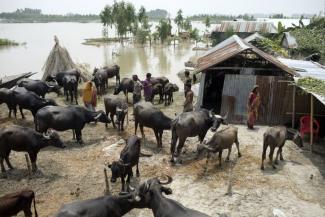Humanitarian aid
Prevention is better

The impacts of climate change severely affect Bangladesh. The main reasons are the country’s monsoon climate, its delta location, its long coastline and extensive lowlands. Bangladesh ranks sixth in the global climate-risk index which spans the past 20 years and was prepared by the civil-society organisation Germanwatch. This summer, monsoon rains that were much stronger than usual destroyed the harvest of 1.5 million farmers – and thus their livelihoods.
“Climate change is one of the main obstacles for development,” says Rashedujjaman Rashed, director for multilateral economic affairs at Bangladesh’s Ministry of Foreign Affairs. The country’s high population density aggravates the situation, he argues. The government is rising to the challenges with several initiatives. It has allocated $ 400 million of domestic funds to dealing with climate-change induced migration. However, Bangladesh cannot cope on its own. “We need international support,” Rashed stressed at a side event during the UN climate summit in Bonn in November.
The German Red Cross has chosen Bangladesh as a pilot country to test a new concept of humanitarian aid. So far, the agency has stuck to the usual scheme: a disaster takes place, it puts people in an emergency situation, and their needs are identified. Next, aid organisations call for donations. They use the money to buy food, medicines and other relief supplies and distribute them to the victims.
The new anticipatory approach is different. The idea is to provide aid before a disaster strikes. Doing so is possible thanks to data such as weather forecasts and satellite-based assessments. According to Stefanie Lux of the German Red Cross, such data has become very reliable, allowing for accurate estimates of, for instance, where a cyclone is likely to hit and how many people will be affected. Forecasts combined with risk assessments serve as a trigger to pay out cash.
The lessons learnt in July this year were encouraging. Before the floods hit Bangladesh, the German Red Cross distributed the equivalent of about € 55 to 1,039 households each. According to Lux, that is what an average household earns per month. “The money enabled the affected people to buy food for themselves and fodder for their cattle.” Moreover, they could bring themselves and their cattle to a safe place.
An evaluation after the floods showed that the number of people who were forced to sell cattle or other assets was much smaller than usual. “Particularly very poor people, who have no savings at all, often have to sell their assets to cope with floods,” Lux reports. In emergency situations, prices tend to fall, and that compounds people’s problems. After the disaster, they can rarely buy back what they sold – and thus plunge deeper into poverty.
The new approach is based on a new, forecast-based concept of financing aid. The idea is to establish an anticipatory humanitarian system. According to Lux, this is a huge challenge, not least because humanitarian agencies need to disburse money before they can start a fundraising campaign after a disaster.
New BMZ fund
Climate-risk insurance is another preventive approach to deal with the impacts of climate change. In the eyes of Vera Scholz, who works for the German government agency GIZ (Deutsche Gesellschaft für internationale Zusammenarbeit) it is a “very important, cost-effective and reliable” instrument to save lives and livelihoods. The German development bank KfW offers such insurance schemes in Bangladesh. They are funded by a new fund established by Germany’s Federal Ministry for Economic Cooperation and Development (BMZ).
In case of a natural disaster, the insurance disbursements serve to buy food and medicines as well as to finance the building of shelters and schools. According to Scholz, only 150 million people globally are insured that way. The BMZ wants to reach 500 million people in developing countries and emerging economies by 2020. It aims to provide insurance schemes not only to countries, but also to cities, companies, communities or households.
Extreme weather events often force people to leave their homes. Preparedness can help to avoid that. Walter Kaelin of the Platform on Disaster Displacement (PDD) says that supporting people to stay, even if they are at risk, is crucial. The PDD is the successor organisation of the Nansen Initiative that aimed to protect people who were displaced by disaster (see D+C/E+Z e-Paper 2017/04, p. 26). In Bangladesh, hundreds of thousands of people are forced to leave their homes every year. When risks are very great, however, it is “better to move people before they become victims,” Kaelin stresses. Properly planned relocation is better than hurried escape. Making such plans is part of an anticipatory aid approach too.







